- Home
- Parris Afton Bonds
Sweet Enchantress Page 5
Sweet Enchantress Read online
Page 5
She lowered her head. Even now this stag of a man had the power to make her foolishly yearn for all that could never be. "I have thought of it, also. But I cannot.”
"This is different, old woman. Tis our Dominique, she needs our help.”
Miserable, she shook her head. "I cannot, I tell you. My knowledge of herbs . . . I can only use it for good. To poison him . . . No, we must trust. We must trust.”
He stretched out his hands and flexed his sausage-sized fingers. "I have thought of strangling him at an unguarded moment I would not mind forfeiting the few years left me to keep our Lady Dominique safe. But if it were not Paxton of Wychchester seeking to claim her county and her life, it would be another like him.”
Her words were anguished with the future she feared. "There is no other like him.”
CHAPTER IV
Paxton felt as irritable as a dog chained for too long. Outside, a spring rain performed a mad dance, and the wind howled like demons.
From Dominique de Bar's library came the brass rattle of the abacus. He found her at her escritoire, calculating numbers from a ledger. At the same time she dictated to a secretary, a pipe-stem of a man in his forties.
Paxton's mailed step must have given him away because at once she glanced up from the Chinese counting instrument. Her gaze turned cold and empty, like that of a marble statue. “You desired me – my Lord Lieutenant?”
Desired her? Did he?
He really looked at her. An intriguing damosel, her features arresting. But her intelligence, her willfulness, her remoteness—they put off a man. No wonder the virago had not been taken to wife, despite the county’s potential wealth. A man wanted in a woman the softness and gentleness that was his complement, a compassion that did not condemn weakness.
Weakness? If any female would suspect it, surely this virago would. All his weaknesses. Remorse, yearnings, cynicism . . . aye, hatred, even, though the Church condemned that as the most foul of sins.
"The tourney draws near," he said brusquely. "You should be apprised of your part in the ceremony.”
"Can you not just send one of your lackeys with the instructions?"
So that she would not have to endure his presence. That was what she implied. Her condescending attitude infuriated him. He wanted to throttle her, but such an act would give her an advantage, confirming her opinion of him as a brutish lout.
With an effort, he stifled his peppery temperament, brought on by the confining weather he told himself. Nudging aside a gold-and- rock crystal chess set, he settled one hip on the edge of her escritoire. The affronted look on her face was worth the delay in his schedule.
From her secretary's quivering hands, he plucked the wax tablet that with a second draft would be transferred to parchment. "I and my beloved are one,” he read aloud, his tone insulting.
A blush deepened the rose of her cheeks. "Those are not my words.”
"Oh, mayhap, they belong to this bird you talk to.”
His scathing mockery elicited a flash of fiery sparks from eyes as green as English meadows. She dismissed her secretary with a wave of her hand. "A Sufi mystic who lived long ago made that statement.”
He scanned the rest of the script. "It appears to me to be nothing more than a love song.”
“Your derision marks you as a man without a heart.”
He tossed the tablet on the escritoire. "I am a trenchant realist. This courtly love, 'tis only frank eroticism that encourages courtly dalliance and idealizes extramarital love.”
"A realist? You are a savage, sire.”
"’Tis woman who is sauvage. She is ruthless in asking her lover to risk death.”
She spread her hands, capable-looking ones for her fragile build. "She merely requires he prove his love is more than mere passion.”
His finger traced the chess set’s rock-crystal castle then tipped it over. "Tis a frustrated love, the pleasure of suffering, that you would glorify.”
She reached out and, with a saucy smile, flicked the gold king, toppling it. "The greater the love, the greater the pain. The pain of being truly alive.”
"Such love is irreligious.” He toppled the rock-crystal bishop.
Her slender, graceful hand fingered the gold queen. Watching those fingers with their cylindrical strokes, he shifted uncomfortably.
At last, she knocked over the gold queen. “’Tis a higher spiritual experience than that of a socially organized marriage by the Church.” With that, she raised a challenging brow and thumped her queen of rock crystal squarely in the chess board’s center. "Such love is a refining, sublimating force. 'Tis the burning point of life.”
“Or death? I do not agree with Sir Tristan’s tragic intrigue, ‘By my death, do you mean this pain of love?”' He plucked the knight from its square and nudged her queen from the board’s center. “Spare me that, mistress, and I shall live a contented man.”
She tilted her chin, surveying him from beneath lash-veiled eyes. "Contented? I doubt that you shall ever know the peace that comes with that word.”
He came to his feet and stared down at her with a glib curl to his mouth. "No man would in your embrace.”
Her indrawn breath was reward enough. He turned to leave, then added over his shoulder, "Oh, yes, mistress, after the tourney, there will be a gala feast. I advise you to be prepared at that time to make your homage and take your oath of fealty to me.”
“I do not trust this back-country countess.”
Following Paxton, John Bedford stepped around scaffolding-balancing carpenters, who had already erected the tiltyard’s palisades. Behind John scampered Hugh, whom Paxton had newly created as page, and ahead the ever-present cat, Arthur, stalked some prey, a field mouse most likely. April’s sunlight was brilliant but the breeze unduly chill.
“The young woman is helpless, Paxton.”
“Helpless? John, my friend, you are besotted by that curly-haired Provencal wench, Beatrix. Never believe that of any woman, much less this woman, the chatelaine.”
"I tell ye there is no ally to whom she can turn, Paxton. The rest of Languedoc’s counts and princes do not wish to attract King Edward's attention, and our spies tell us that King Philip certainly is not ready t' declare war over the questionable rights of a rather insignificant county. Not yet, at least.”
Paxton halted before a pit where two sturdy yeomen wielded a big two-handed saw on a heavy beam that would help timber the temporary galleries, one on either side of the circular tiltyard. The Round Table work of the tourney was coming along rapidly.
The tiltyard was being created on the edge of a wood that approached to within a league of the village. The field was still dormant from the late winter, although sprouts of grain were shooting up where rainwater pooled. The field was bordered on one side by the river and on the other by the forest, which was fringed with enormous oaks that had to be as old as Methuselah himself and yews that would make the finest bows.
John, witnessing his disquiet, said, “If there is any doubt as to ye power and authority here, the Round Table should satisfy that. When the countess foreswears her allegiance to ye before all her formerly loyal—”
Paxton’s attention was diverted. His eye was on the falcon that circled overhead, sprinting through flight, her wings taking on a pointed, drawn back appearance. "Tis neither her allies nor her loyal vassals that disturb me. Tis the woman herself.”
He glanced at John. The man’s short red beard was split by his grin. His friend cuffed his arm with a fist. "So, at last, a woman has attracted your—"
Paxton’s gaze moved back to the spiraling falcon. She maneuvered through the air with spectacular, but reckless, abandon. “No, not that way, John. The needs of my loins can be easily slaked.”
“Ah, then, Paxton, ye will admit she does stir your desires.”
"Nay, not even that.” He began walking again, dodging a cart drawn by a yoke of slow-gaited oxen. He strode purposefully into the field. He considered the headstrong woman. Her indomitable pride
, her damnable resolution, and her impetuousness in choosing to sit at the lower table irritated him. But it was something more that irritated him. "I do not trust her because—”
The falcon ceased her soaring, hovered, then begin her dive for her prey. "Because there is something”—he could have said impenetrable or incomprehensible, but he was not even sure himself if that was what he meant—"something strange about her,” he finished with dissatisfaction at his inadequate way with words.
John peered at him with dismay. "Paxton, ye have never been one to be obsessed by mythological tales of sorcery and demons and—”
He raised a silencing palm. At the meadow’s far edge, Dominique de Bar’s page held the reins of three riderless horses. "I gave you orders to see that she was constantly watched, John. Why is she falconing today?”
"Why . . . she asked permission, Paxton. Except for the one night she appeared for dinner, she has been confined to her suite of rooms.”
His mouth compressed, expressing his checked displeasure.
"Riding with her is the guard I posted on her,” John added. "And, of course, the Templar and her cadger.”
"And her domestic steward, the Jewess? She is still at the chateau then?”
"Iolande? Aye. I doubt me that the countess would make an escape without the old sibyl.”
"The countess can run to the ends of the earth for all I care but not before she does homage to me as a vassal, and her authority is properly and legally transferred to me.”
He set out for the forest edge with a purposeful stride. Carried on the air, he heard her musical laugh, the sound of witchery, by the body of Christ!
Dominique loved the bird of prey she had trained. Reinette’s fierceness, her clean-lined beauty, her dazzling speed, her courage and daring élan on the wing, all personified independence.
If Dominique ever achieved that ability to escape her body at will, as Chengke had promised was possible, and take flight, it would have to be as a falcon. In fact, it had been Chengke who had instilled in her the love of falconry, a sport he claimed had been practiced in China two thousand years before Christ.
She watched as Reinette took sight of a prey somewhere in the forest below. The falcon passed high overhead at full speed, and it was like the noise of parchment tearing. Dominique could even hear the sound of her dive as she pulled out of descent, wings neatly folded. Towering sheer cliff walls of the nearby mountains echoed the impact of her hitting her quarry at full speed, a sharp cracking sound.
The falcon, Dominique knew, would stoop, or dive, toward the quarry, her spurs laying open for the prey. Then her talons would squeeze the weakened prey until it ceased to struggle.
Baldwyn's leonine head canted. "Do you hear her bell, my lady?”
Dominique stilled, listening for the sound of the bell attached to Reinette’s tail. The bell monitored both the falcon’s activity and location and could be heard more than half a league away, depending on the weather. She heard not the bell's tinkle but the faintest crushing of leaves underfoot.
At the rustling of underbrush directly behind them, both she and her retinue whirled. Paxton of Wychchester stepped into the leaf-shadowed glade. The guard John Bedford had saddled her with sheepishly sighed his relief. Baldwyn relaxed his vigilance. Her young cadger released his death grip on the cadge, her falcon's rectangular perch for field use.
She did not move. She knew neither she nor Paxton had forgotten the meeting of their wills and philosophies during the challenging conversation in her library days before. His education was extensive for that of a mere soldier.
His predatory gaze locked on her. She felt as though the two of them stood in empty space, beyond middle ground and solid objects. She could see he was experiencing something unusual, also. His expression was that of a warrior who expected an attack— extreme alertness, registering everything that goes on around him without being distracted by it for an instant.
"You wished something, my Lord Lieutenant?” she got out at last, her tone like lye.
"Merely to witness your expertise at falconry.”
Her lids narrowed. She was not certain if he ridiculed her. What was his purpose here? Her eye took note that the hunter's green of his tunic countered well his monotone coloring. All brown. The brown of his sun-and-wind weathered skin; his straight, short hair; his darker eyes. Brown, like winter grass. Brown, the absence of life. No, only the dormancy of life. Black was the absence of life. Black was the center of his eyes, and at that moment she was caught in his stare like a bird in hunter’s lime.
Pushing aside the brush, he entered the glade, and she noticed only then that his captain and Hugh followed upon his heels. “I have had little opportunity to learn the sport, mistress.”
Still, he addressed her by that common term! "Naturally, for I am told the knaves of England are permitted only the useless kestrel with which to hunt."
Baldwyn flashed her a warning glance. The usually smiling John Bedford shifted nervously. Her gaze darted back to the lieutenant. His face had darkened, and the aura of his wrath was almost tangible. The forest sounds were muted by the moment.
"As you have quite clearly received an education, I would have imagined you have been taught Latin, mistress,” he said, his voice almost conversationally pleasant. "As such, you must be aware that in the Scriptures the word 'witch' is of the feminine gender, is it not?”
No idle observation but a warning, she knew.
The cacophony of the forest erupted again, with the falcon's bell tinkling wildly overall. She whirled and hurried in that direction— without asking permission to take her leave.
Twigs scratched her face, as she pushed deeper into the forest. The tinkling led her to a patch of dense scrub oak. Softly, she called, "Reinette,” and the bird of prey fluttered from the underbrush to regain her outstretched fist. Her critical eye examined Reinette's plumage, damaged by the thickets.
"My Lady Countess?” At her side, her cadger proffered from the falconry bag the jesses that secured the creature’s yellow-scaled gaiters.
Coming upon her, the others rejoined her as she deftly slipped the hood over Reinette. "What have you bagged, my lady?” asked Baldwyn.
"I’m not certain.” She passed Reinette to her cadger. "You saw how she had raked away.”
"Uh-huh, she lost all interest in the pigeon and begun to wander after activity below her. Dinner tonight may not be all that I had anticipated.”
Dominique was oblivious to the others until Paxton of Wychchester spoke in a drawl that was as smooth as spiced wine and carried as much potency. "Perhaps you will crawl into the underbrush, mistress, and display for us today's catch.”
"My Lord Lieutenant,” John offered, "I'll retrieve the prey for—”
"No.”
Baldwyn spread his spade-sized palms. "But 'tis not seemly that—”
"No!” Paxton folded his arms. “The hunter —huntress—will retrieve her own prey, as the common folk do.”
Everyone stood paralyzed. She glanced at the copse and swallowed hard. She had done it again, aroused his antipathy by forgetting her place as his vassal, and he was quite clearly reminding her. She had not crawled on her knees since childhood, but she could not give him reason to oust her from Montlimoux, not yet.
Resolutely, she trussed her cotton smock at her waist, exposing the course, gray underskirt she used for hunting. There was a collective and not quite smothered gasp from her retinue as she went onto her knees and pushed forward into the brambles with the utmost caution. Falcons loved to prey upon snakes.
Her eyes had to adjust to the diminished sunlight. The pungent odor of alluvial soil and decayed leaves, crushing under hand, rose to fill her nostrils. Just beyond, a salamander disturbed the leaves as it took flight from her. Further into the brush a thorn gouged her ungloved palm, and she yelped. She paused to extract the thorn and that was when she spotted the bloodied quarry. A ferret, a raccoon, she couldn’t tell which until she turned it over.
Her outcry echoed in the forest.
CHAPTER V
"Please, leave me enter.”
“’Tis unwise, my lady,” John Bedford said low, closing the privy chamber door behind him. “I have never seen Paxton in such a mood. I only wish he would vent his wrath at me. I could handle it.”
She smiled wanly. "You would have him kill you instead of me?”
His mouth crimped in an attempt to return her smile. "Kill me, no. But vent his anger through fighting. We used to wrestle, and once I held my own with him.”
She placed her hand on his doublet sleeve. "What happened today—I am responsible. I had no idea the cat was anywh—”
"Ye don’t understand, my lady. The cat was . . . well, Paxton was fond of Arthur.”
"Obviously,” she said dryly.
"It was more than that.” He half chuckled. "Paxton even carried that cat with him when he went to call upon a highborn lady with whom he was, shall I say, enamoured. ‘For courage,’ he told me.”
"Courage? Your lieutenant lacking courage? Compassion he may lack but not courage. Now leave me enter.”
She maneuvered around him and opened and closed the door before he could gainsay her. Only one candle lit the chamber, a room much like her own but smaller and used to quarter quests. Paxton sat before the fire. At his feet lay the dying cat. Blood pooled around the animal. It was obvious that death crouched only hours away at most.
At her entrance, the man glanced at her, then back to the fire. "I am sorry,” she began.
“My Lord Lieutenant,” he corrected in a low voice.
She sighed. "I am sorry, my Lord Lieutenant. Truly sorry.”
He raised a hand, and the firelight glinted on what he held. A knife. He twisted the blade this way and that, reflecting the fire's sheen eerily across his face. Her heart stopped.
He must have noted her stricken expression. He laughed nastily. "No, not for you. My revenge will be much more subtle, mistress. The knife blade is for my cat. You see, I am trying to summon courage to end its suffering. As I heard John tell you, courage does not come easily for me."

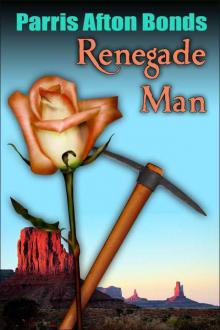 Renegade Man
Renegade Man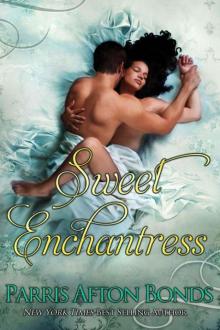 Sweet Enchantress
Sweet Enchantress Savage Enchantment
Savage Enchantment Mood Indigo
Mood Indigo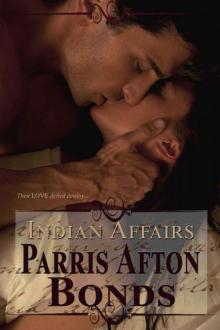 Indian Affairs (historical romance)
Indian Affairs (historical romance)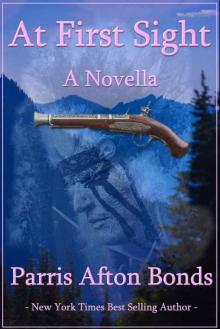 AT FIRST SIGHT: A Novella
AT FIRST SIGHT: A Novella The Maidenhead
The Maidenhead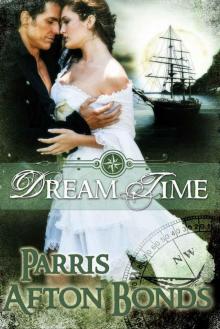 Dream Time (historical): Book I
Dream Time (historical): Book I Made For Each Other
Made For Each Other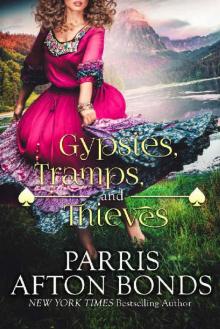 GYPSIES, TRAMPS, AND THIEVES
GYPSIES, TRAMPS, AND THIEVES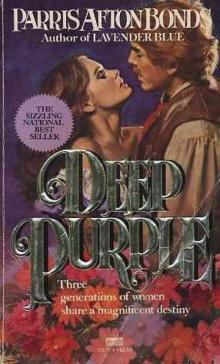 Deep Purple
Deep Purple Tame the Wildest Heart
Tame the Wildest Heart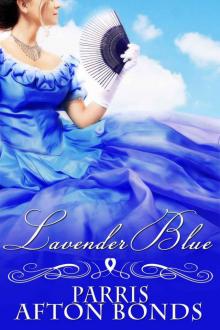 LAVENDER BLUE (historical romance)
LAVENDER BLUE (historical romance)